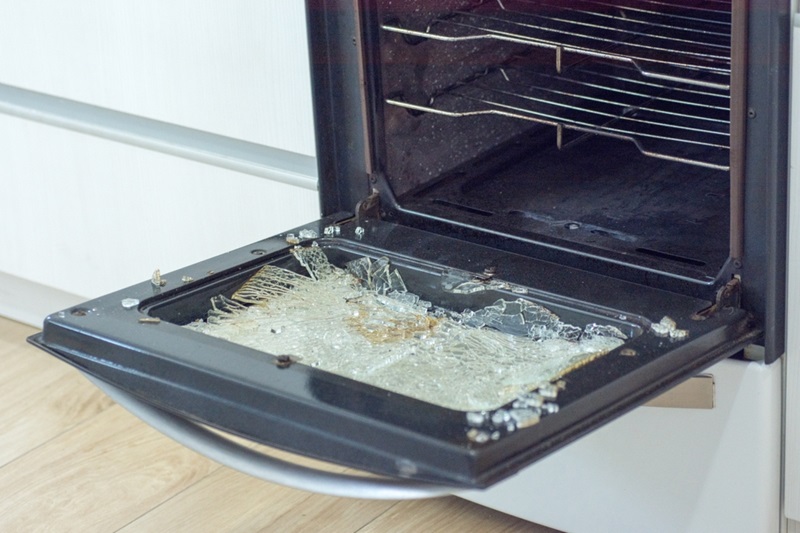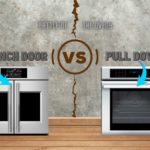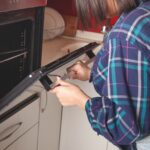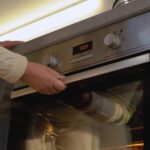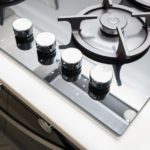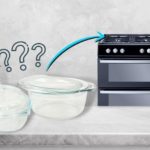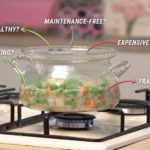Has your glass oven door shattered? It’s rare for the glass in your oven door to break as the glass is tempered, meaning it’s strengthened to make it more resistant to temperature changes than regular glass. However, it can shatter in certain situations, usually in an explosive, violent manner.
So, what causes oven door glass to shatter? Can you still use your oven if the glass door is cracked? And what should you do if the door explodes and breaks?
The answers to all these questions and some preventative tips can be found below, so keep reading for everything you need to know about shattered oven doors.
What Causes Oven Door Glass to Shatter?
Although rare, oven door glass can shatter for various reasons. Understanding these factors can help prevent accidents and ensure the safe use of your oven.
Some common causes include the following:
1. Thermal shock
One of the most common reasons for oven door glass shattering is thermal shock. This occurs when there is a rapid and extreme change in temperature across the surface of the glass, causing one part of the glass to be significantly hotter than another.
For example, if a hot oven door comes into contact with cold water or a cold surface, the sudden temperature change can cause the glass to shatter.
In converse, uneven heating may result from placing extremely hot cookware directly against the cold glass.
If the seals around the oven door are damaged or not functioning properly, hot air and steam may escape. This can also lead to temperature fluctuations and uneven heating that can stress the glass.
2. Manufacturing defects
Occasionally, manufacturing defects can weaken the glass, making it more susceptible to breaking. The two main manufacturing defects are as follows:
- Inclusions and imperfections: During the manufacturing process, tiny imperfections called inclusions can weaken the structure of the glass. These imperfections may not be immediately visible but can compromise the integrity of the glass over time.
- Improper tempering: Tempering is a process that strengthens the glass. If the tempering process is not done correctly or if there are variations in the tempering, it can result in glass that is more prone to breakage.
3. Accidental impact
Physical impact, such as dropping or banging a heavy item on the glass door of your oven, can lead to breakage.
This is one of the many reasons why it is essential to handle cookware carefully, especially when dealing with heavy pans and weighty enamel cookware.
If you have just bought a new oven and the door has shattered, there is also a chance that the glass was damaged during transit.
Any knock on the journey from the warehouse to your home could weaken the glass and cause the door to shatter once the oven is turned on.
4. Improper cleaning
Using abrasive materials or tools during cleaning can scratch or weaken the glass. When it is later exposed to high temperatures during cooking, it is more likely to shatter and break.
Harsh chemical cleaners may also damage the glass or the seals around it, compromising its structural integrity and contributing to thermal shock due to hot air escaping.
5. Faulty installation
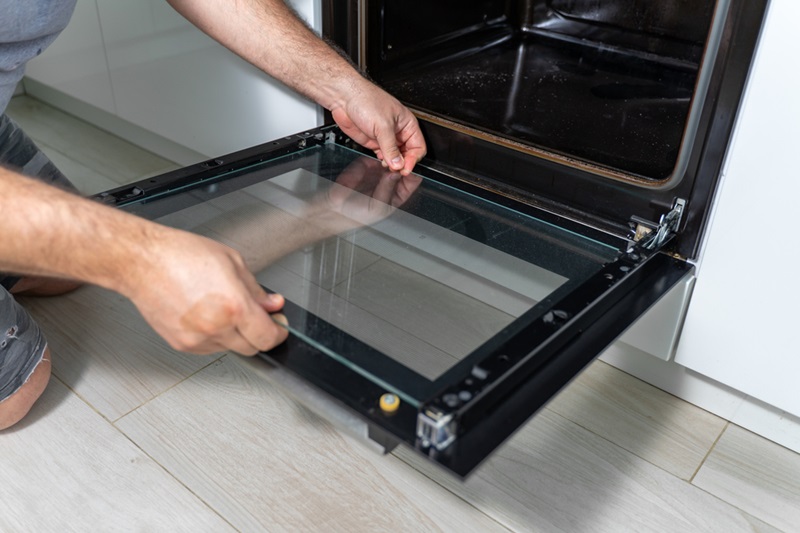
Incorrect installation of the oven door or glass can lead to stress on the glass and compromise its structural integrity.
Most installation issues are related to:
- Alignment issues: Incorrect installation can lead to alignment issues with the oven door, causing stress on the glass. If the oven door doesn’t close properly, it may result in uneven pressure on the glass, increasing the risk of breakage.
- Tightening screws: If screws are overtightened during the installation process, it can create stress points on the glass. When the oven is on and the stressed glass heats up, it is more prone to shattering and breaking.
6. Age and wear
Over time, repeated use of your oven and frequent exposure to high temperatures can cause the glass door to weaken. This makes it more susceptible to cracking and breaking.
The rubber seal around the oven door can also deteriorate with age. The seal is responsible for keeping the oven door tightly closed and keeping the heat inside the oven.
When compromised, hot air and steam can escape, leading to temperature fluctuations that cause the glass to shatter.
Is It Safe to Use an Oven with a Broken Glass Door?
If the glass on your oven door has shattered, you should not use your oven. This applies even if the shattered glass is still held within the frame or if only the outside or inside panel of the door is broken.
Doing so is unsafe, can cause further damage to your oven, and impact the quality of your food.
Here is a closer look at why you shouldn’t use an oven with a broken glass door:
- Increased risk of injury: Shattered glass can be sharp and may pose a risk of injury. Anyone near the oven, especially during cooking or cleaning, could be at risk of cuts or other injuries from the broken shards of glass.
- Risk of glass shattering: Most oven doors have at least two glass panels, an outer and an inner panel. If one panel is shattered or missing, the remaining panel is exposed to more heat and is more likely to crack or explode.
- Compromised insulation: Oven doors provide insulation, keeping the heat inside and protecting the external surfaces from becoming hot. A shattered glass door may compromise this insulation, leading to overheating of external surfaces and increasing the risk of burns.
- Impact on cooking performance: The shattered glass can disrupt the oven’s ability to maintain an accurate temperature, impacting the cooking performance. This can result in unevenly cooked food and may lead to food safety concerns.
What Should You Do If Your Oven Door Shatters?
Has the glass on your oven door shattered? If so, taking immediate action is important to ensure safety and address the issue.
Here are the steps you should follow:
- Turn off the oven: If the oven was on when the glass door shattered, turn it off immediately. If possible, disconnect the power supply to ensure the oven can’t accidentally be turned back on. Open windows and doors to ventilate the area and allow any smoke or fumes to escape.
- Document the incident: With the oven safely turned off, take pictures of the shattered glass and the surrounding area. These images may be helpful for documentation purposes, especially if you need to file a warranty claim or insurance report.
- Clean up the broken glass: Carefully clean up any broken glass. Use a broom and dustpan to sweep up larger pieces and a vacuum cleaner with a hose attachment to capture smaller shards. Be thorough to avoid leaving any glass fragments behind that could cause cuts.
- Contact the manufacturer: Reach out to the oven manufacturer as soon as possible, providing details about the incident and inquiring about the next steps. They may guide you on warranty coverage, sourcing replacement parts, or recommending technicians.
- Professional inspection and repair: Arrange for a qualified technician or repair professional to inspect the oven. They can assess the extent of the damage, determine the cause of the shattering, and recommend necessary repairs or replacements.
Remember that the safety of yourself and others is the top priority. If you are unsure about any aspect of the situation, seek professional assistance.
Please do not use the oven until it has been inspected and repaired by a qualified technician to ensure it is safe for use.
How Can You Prevent Oven Door Glass from Shattering?
Some causes of an oven door breaking are outside your control, such as problems arising in manufacturing, transit, or installation.
However, you can take several preventive measures and adopt good practices to help prevent your oven door glass from shattering. Here are our top tips to follow:
- Avoid exposing the hot oven door to cold water, as sudden temperature changes can cause thermal shock and cause the glass to shatter.
- Avoid placing extremely hot cookware directly on a cold oven door.
- Ensure that the oven door is correctly installed and aligned.
- Be cautious when handling heavy cookware or utensils near the oven to avoid accidentally breaking the door through physical impact.
- Use professional oven cleaning methods and non-abrasive materials when wiping the glass.
- If removing a glass panel for cleaning or maintenance, ensure you don’t overtighten the screws that hold the glass in place when refixing the panel.
- Avoid slamming your oven door shut or applying excessive force, which can stress the glass.
- Regularly inspect the seals around the oven door for damage and replace them as needed.
- Periodically inspect the oven door for any signs of damage or defects. If you notice cracks, chips, or other issues with the glass, address them promptly.

Hannah is a freelance content writer and self-proclaimed foodie. When Hannah isn’t sitting tapping at her laptop, you’ll probably find her in the kitchen. As an ex-chalet host, she’s used to cooking four-course meals for 10+ people and loves feeding friends and family whenever possible.

